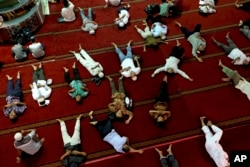From VOA Learning English, this is the Health & Lifestyle Report.
March 16 is International Sleep Day.
And we should all celebrate the act of sleeping. Studies have shown that a good night’s rest helps us stay healthy, both mentally and physically. And researchers say sleep is probably the best tool we have for memory and learning.
Michael Twery is director of the National Center on Sleep Disorders Research at America’s National Institutes of Health. Twery is an expert on the science of sleep and sleep disorders. He told me that a good night’s sleep helps to learn better.
“Getting a good night’s sleep is important for the learning and memory process. It’s important because it stores the training exercises and the learning exercises into our more permanent memory while we’re sleeping 7-8 hours in bed. And then the next morning when you wake up your mind is better prepared to act on that information.”
But what about getting rest during the middle of the day? Short periods of sleep may help our brains work better, or so says a recent study on napping.
Past studies have shown that napping can help babies and young children learn better. And napping can help brain performance in older adults.
Taking a nap may also help this group of people fight off age-related memory loss.
Many Americans do nap. But one-third of all adults in the United States are also chronically tired, notes the U.S. Centers for Disease Control and Prevention (CDC). It found that 50 million to 70 million Americans have chronic sleep disorders.
So, someone who naps as a way of paying off a sleep debt may not experience the same improvements from napping as a healthy, well-rested person would.
Also, many people may not want to admit that they take a nap. They may think that napping shows they are weak or lack energy. That only children, the very old, sick or lazy people nap is not an uncommon opinion.
In fact, we Americans sometimes do a very strange thing. Some brag about how few hours of sleep they need each night.
Health experts suggest that adults get seven to eight hours of sleep each night. People who claim they only sleep five hours a night, they may think they are somehow stronger than the average human – superhuman, if you will.
However, that may be changing. Many offices now offer napping rooms and napping cafes are appearing in many U.S. cities, including Washington, D.C.
While resting in the middle of the work day may seem like a luxury to Americans, napping is very much part of a normal, everyday life in other parts of the world.
The China sleep study
Take China, for example. While it depends on the age and job, China, generally speaking, is a land of nappers.
So, researchers recently looked at information provided by nearly 3,000 Chinese adults, aged 65 years or older. They wanted to learn if napping after a mid-day meal, a tradition in some areas, had any effect on the mental performance of the subjects.
First, the researchers asked the people if they napped and for how long. Then, based on their answers, researchers put them into four groups: non-nappers (0 minutes), short nappers (less than 30 minutes), moderate nappers (30-90 minutes), and extended nappers (more than 90 minutes).
Nearly 60 percent of those 3,000 people said they did take a nap after lunch and that their naps lasted anywhere from 30 to 90 minutes. Most of the subjects who said they napped said they napped for about an hour.
The study found that people who took an hour-long nap did much better on mental tests than those who did not nap. The hour-long nappers also did better on the tests than those who napped for shorter and longer periods. In this study, it seems that the most effective nap lasted for about an hour, but not much longer.
These researchers reported their findings in the Journal of the American Geriatrics Society.
Keep in mind, however, that these are the findings for those over the age of 65.
Yet Doctor Michael Twery notes that an hour long nap may be too long for young, healthy adults.
“Currently, we’re recommending that we try to sleep for about 30 minutes or less. And 30 minutes is enough to remove the pressure to sleep and will help us feel more awake. If we nap longer, we will get trapped into those deeper layers of sleep, which can be hard to get out of.”
The feeling Twery described is called sleep inertia -- the period when you awake from a very deep sleep. For a time, you are unable to think clearly.
“So sleep inertia is when someone is being awakened from deep sleep. Some individuals may find it hard to change instantly from that deep sleep – where everything is a bit foggy and confused – to the fully awake state. We may be a little bit clumsy. We may not have all our thoughts in order when we wake from deep sleep."
The National Sleep Foundation also warns that if you have trouble falling asleep at night, limit your daytime nap to under 45 minutes. Also nap before 3 p.m. in the afternoon.
And that’s the Health & Lifestyle report. I’m Anna Matteo.
Are you a napper? Does your life style allow you to take a nap midday? Is napping common in your culture? Share your thoughts with us, we would love to hear from you.
Anna Matteo reported on this story for VOA Learning English using information from ScienceDaily.com, MedicalNewsToday.com and several health websites. George Grow was the editor.
Let us know in the Comments Section.
________________________________________________________________
Quiz
________________________________________________________________
Words in This Story
nap – n./v. to sleep briefly especially during the day
chronic – adj. continuing or taking place again and again for a long time
lazy – adj. not liking to work hard or to be active
brag – v. to talk about yourself or your successes in a way that shows you are more important or better than other people
luxury – n. something that is helpful or welcome and that is not usually or always available
geriatric – adj. of or relating to the process of growing old and the medical care of old people
sleep inertia – n. the state of not being able to think or act clearly immediately after waking from sleep.
foggy – adj. unsure or confused
confused – adj. unable to understand or think clearly









